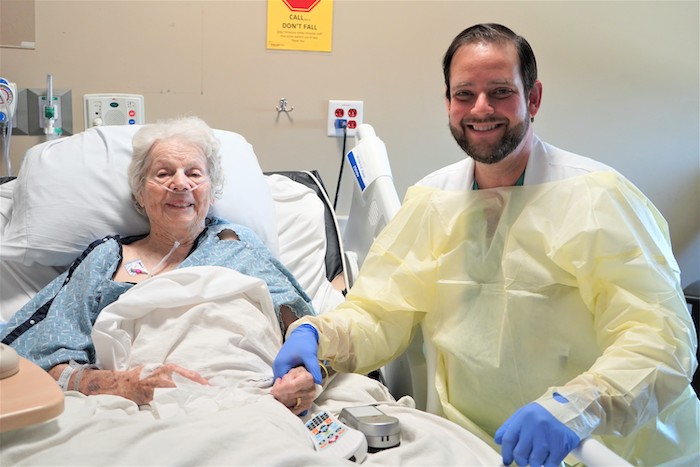A Record-Breaking Stroke Journey
 Mary Trout was concerned. She was having difficulty speaking, her gaze was wandering and her right arm was paralyzed. Mary was having a stroke. When the EMS team responded to her 911 call, they immediately recognized the urgency and sprang into action, alerting Southwest Healthcare Temecula Valley Hospital of Mary’s critical condition.
Mary Trout was concerned. She was having difficulty speaking, her gaze was wandering and her right arm was paralyzed. Mary was having a stroke. When the EMS team responded to her 911 call, they immediately recognized the urgency and sprang into action, alerting Southwest Healthcare Temecula Valley Hospital of Mary’s critical condition.
Temecula Valley Hospital is certified by DNV as a Comprehensive Stroke Center, reflecting the highest standards for the treatment of serious stroke events.
Upon her arrival, the dedicated team at the hospital wasted no time. Mary was diagnosed quickly with a severe left middle cerebral artery (LMCA) stroke.
Anticipating the gravity of the situation, the hospital immediately mobilized its resources, including pre-notification of Medical Director of Neurology Robert Jackson, MD, and highly skilled neuro interventional technologist, Amir Khan, MD.
Reaching a New Milestone in Care
Thanks to meticulous preparation and decisive action, the hospital achieved an exceptional milestone: an impressive 12-minute door-to-needle time for administering Tenecteplase (tNK) therapy, the fastest in the department's history.
tNK is a powerful protein used to dissolve blood clots in stroke patients like Mary. It is a blood-thinning medication that is administered through an IV.
In the race against time, every minute is crucial, with up to 1.9 million neurons at risk per minute during a stroke event, according to the National Institutes of Health. Mary’s timely, rapid treatment was absolutely vital to her recovery.
Following tNK therapy, a confirmatory scan revealed a significant middle cerebral artery (MCA) blockage. The MCA is an artery that sends blood to the sides of the brain. With the consent of Mary’s family, the neuro interventional technologist team performed a thrombectomy to remove the blockage, further enhancing her chances of recovery.
The results were nothing short of miraculous. Mary’s NIH Stroke Scale (NIHSS) score, a way of gauging stroke severity in which lower numbers are better, plummeted from 25 upon arrival to an impressive 4 by the following day, a testament to the effectiveness of the rapid intervention by the hospital team.
Quick Action Can Save Lives
Mary’s story highlights the critical importance of swift action in stroke management. It’s a testament to the dedication, expertise and collaborative effort of the entire medical team that cared for Mary. Together, we’re working to elevate the standards of stroke care, one successful treatment at a time.
